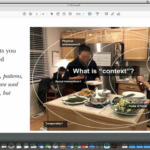
Intelligences
Hybrid Methodology: Combining Ethnography, Cognitive Science, and Machine Learning to Inform the Development of Context-Aware Personal Computing and Assistive Technology
Dhanabir Sharma • 0 Comments


An EPIC Talk with LAURA E. MATZEN and LAURA A. MCNAMARA, Sandia National Laboratories March 6, 2018, 12:00–1:30pm PST Free online event, pre-registration & EPIC Membership required [s2If !is_user_logged_in()] To register: JOIN EPIC or LOG IN [/s2If] [s2If current_user_is(subscriber)] To register: JOIN EPIC [/s2If] [s2If current_user_can(access_s2member_level1)] REGISTER NOW [/s2If] Overview Over the past decades, eye…
